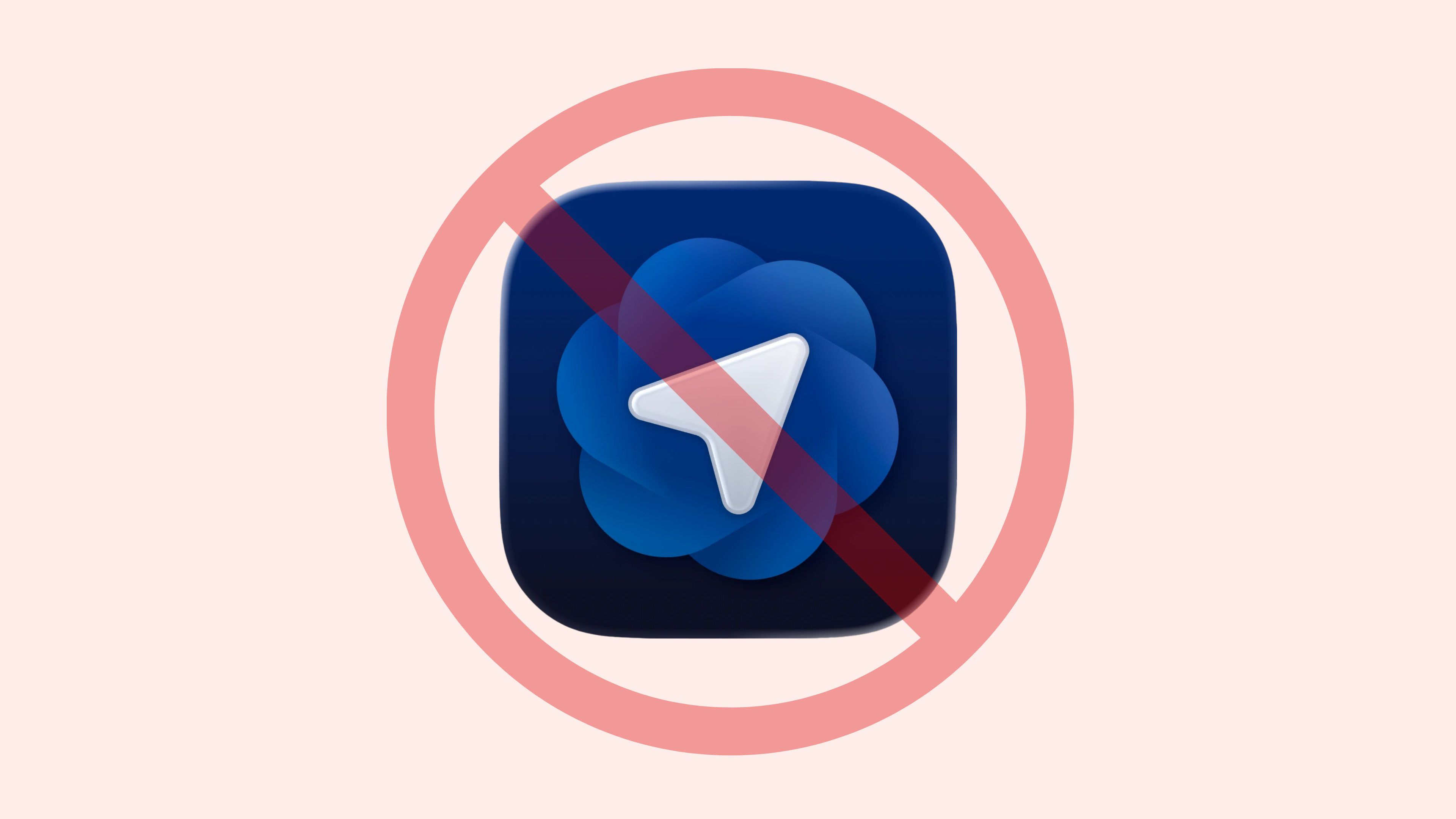Don’t install Atlas AI browser - here’s why.
OpenAI’s Atlas browser with built-in ChatGPT is marketed as being a step closer to a ‘true super-assistant,’ but it’s more like a true privacy nightmare. Let’s take a look at why ChatGPT Atlas browser must be avoided.
Summary: Why you shouldn’t use ChatGPT Atlas
- The AI can read and store everything – even your mailbox or bank account when logged in
- It’s not possible to know what Atlas will or won’t remember
- Incognito isn’t truly private
- Your browsing data could be handed over
- Agent Mode introduces more risk
What is the ChatGPT Atlas browser?
In October 2025, OpenAI released ChatGPT Atlas. Before this browser emerged, users could search in ChatGPT, but with this latest AI browser release, the AI tool follows you while you browse the web, it watches where you click, and remembers everything you’ve done to get a better idea of your behaviors and patterns. The ultimate goal of OpenAI is that its browser becomes a super assistant.
OpenAI’s Atlas is different from regular browsers, like Chrome or Firefox, because it has two functions that change the way browsing works:
-
Browsing memories: It records key details from the sites you visit and tracks how you interact with them. It does this to make ChatGPT’s answers more personalized.
-
Agent mode: In this mode, the AI can navigate the web on your behalf and run tasks in the browser from start to finish. For example, in a demo from OpenAI developers, it was shown how ChatGPT could search for a recipe online and then buy all the ingredients.
For personal use, ChatGPT Atlas is currently available on MacOS for Free, Plus, Pro, and Go users. The browser’s agent mode is available for preview for Plus, Pro, and Business users. For business, enterprises, and Edu users (if enabled by their plan administrator), Atlas is available in beta.
How to turn off Google Search AI mode
Why ChatGPT Atlas isn’t safe & should be avoided
It can read everything you’re logged into
If you grant it the permissions upon setup, Atlas builds a huge database of memories of the websites you visit, and based on what you search for, it creates facts and insights. Because of these recorded memories, it can recall them when asked. For example, you could ask Atlas to open all the website tabs of the fridges you looked at over the past two weeks.
This might sound useful, but it’s important to remember that this degree of personalization means Atlas needs to track and have access to just about everything you do. This opens the door to potential privacy and security risks.
Think about it like this: if a product, whether it’s an AI browser like Atlas or social media platform, wants to offer you a super personalized experience, it needs to learn a lot about you, and it does this through tracking, processing, and collecting your data.
It’s impossible to know what Atlas will or won’t remember
OpenAI has said that the memories could include tasks you worked on and preferences, but not the whole page contents. Atlas AI browser is also not meant to remember personally identifiable information like bank account details, passwords, addresses, government IDs, and the content of some sensitive websites, for example, sites with adult content.
While this is what it says, it’s hard to know if you can trust the AI to actually stick to these rules for what it can and can’t remember. For example, Lena Cohen, a staff technologist at the Electronic Frontier Foundation, reported that a test discovered that Atlas kept memories about a user registering for “sexual and reproductive health services via Planned Parenthood Direct”.
Incognito isn’t truly private
Atlas has an Incognito mode where it doesn’t save what you browse to your browser history or link the data to your ChatGPT account. In this mode, ChatGPT also doesn’t save the cookies, site data, or information entered into forms after your incognito session ends. But in this mode, your actions are still being tracked by the Atlas browser and ChatGPT.
On the OpenAI website, under ChatGPT Atlas Data Controls and Privacy it even states, “Incognito doesn’t make you invisible to ChatGPT or the rest of the internet.”
So what does Incognito mode even do? When searching in this mode, it means you’re signed out of your own account, but you are still visible to ChatGPT and others. For example, if you have chats with ChatGPT in this mode, they are not saved to your account, but ChatGPT retains them for 30 days for abuse detection and prevention purposes. It also notes that you’re visible to third parties, and that activity might also be seen by your employer, school, or ISP.
If this sounds all too familiar, that’s because it is. Google Chrome’s Incognito Mode also mislead users to believe it was searching anonymously. When the user hears the word incognito, it’s often automatically assumed it means private and anonymous, but very often it’s clever wording and privacy washing.
Your browsing data could be handed over
When a browser has the ability to track and collect so much information, we have to consider how and if this could be used against us. OpenAI is an American Tech Giant, and it operates under US jurisdiction. Because of this, it’s much easier for law enforcement and government to monitor and request user information, compared to other countries for example, Germany, a country with some of the strictest data privacy laws.
In a response to Geoffrey A. Fowler’s article written for The Washington Post, OpenAI said that it would only disclose user data under “valid” legal processes or in an “emergency situation”. The AI tech giant also said that the browser held memories on its servers for 30 days, and then deleted them. OpenAI’s policy also says that when a user deletes a chat, it is only scheduled for permanent deletion from OpenAI’s systems within 30 days.
With these data retention policies in place, it’s important to remember that even when you delete your browsing history and chats within Atlas, it isn’t actually deleted until up to 30 days later.
Agent Mode introduces more risk
Cybersecurity experts have been warning about the potential risks and threats associated with these new AI agents in browsers. For example, Perplexity’s Comet Browser is vulnerable to CometJacking, and Atlas isn’t exempt from vulnerabilities either. LayerX recently discovered the first vulnerability to impact OpenAI’s Atlas browser, which allows cybercriminals to inject malicious instructions into ChatGPT’s “memory” and execute remote code. According to LayerX, “This exploit can allow attackers to infect systems with malicious code, grant themselves access privileges, or deploy malware.”
LayerX also reports that this vulnerability affects all ChatGPT users on any browser, but the risks are higher for users who are using OpenAI’s agentic browser, Atlas. The AI and browser security company also says that Atlas currently doesn’t have any “meaningful” anti-phishing protections, and because of this, users who use Atlas ChatGPT browser are up to 90% more vulnerable to phishing attacks than users who use traditional browsers like Chrome or Firefox.
OpenAI benefits at your cost
While these features in ChatGPT Atlas are optional, they serve to benefit OpenAI
According to Fry, OpenAI only uses the browsing content to improve features in Atlas:
“We are using memory specifically to enhance the product features of Atlas — not for anything else,” Fry said. “The way we use data here is pretty different from social media companies that build interest profiles.”
OpenAI has said that these features are optional and that users have the choice to disable them, erase data, and browse privately. In addition to this, the user’s browsing history isn’t used for training AI models unless enabled to. While these features are optional and users can disable them, who actually does this?
Most people are too lazy to manually change their settings: So the company chooses the settings that benefits them and not the user. A perfect example of this is LinkedIn opting everyone in without asking for consent to have their data used for AI training, or Meta’s Facebook, which also opted everyone in without asking to having all public data used for AI training.
Your data belongs to you
And lastly, something worth questioning is what will happen when OpenAI starts advertising? Will all the data it has collected while you browsed the web be sold to advertisers, who in return, target you with annoying ads? and will they quietly change their policy to opt you into having your data used to train their AI models? - just like other tech giants recently did.
Google removed its don’t be evil motto, Meta decided that your public posts would train its AI, who knows what OpenAI will do in the future.
Protect your privacy, use a private browser, and don’t fall into the AI hype - your data is worth so much, don’t give it to AI!


